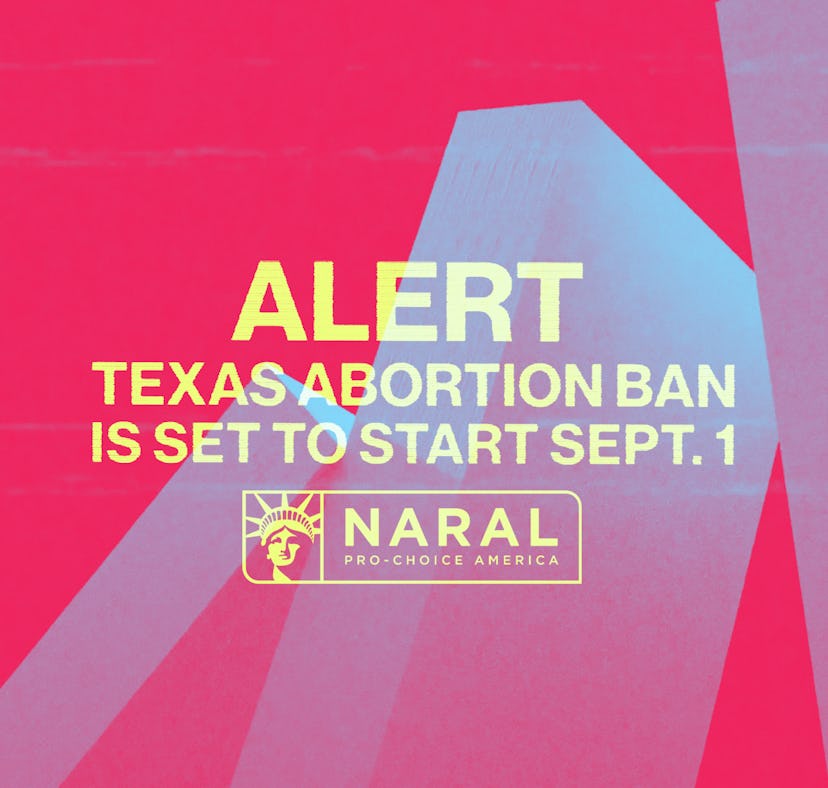
Texas' New Abortion Law Is Scary For A Whole New Reason
Dangerous abortion laws are sadly nothing new — but this is something entirely different.
Fall is around the corner, and with it comes cozy drinks and fuzzy scarves — and upsetting restrictions on reproductive rights. On Sept. 1, one of the harshest abortion restrictions in the country is set to go into effect. In Texas, SB8 not only restricts abortions at six weeks — before many people even know they’re pregnant — but also creates a new legal framework in which anyone who helps someone access abortion can be held legally liable. That’s why NARAL Pro-Choice America’s new ad is trying to raise awareness and push back on this law and others like it before it starts a new trend.
SB8, which was passed in May of 2021, is part of a pattern of so-called “heartbeat bills” restricting abortion around the country. The bill would prohibit the right to abortion at six weeks after conception, the point at which cardiac activity can be detected. It’s also before many people even know they’re pregnant, when a menstrual cycle would be just two weeks late. While the bill is facing multiple challenges in court, it remains due to go into effect in September. Similar bills have been attempted in more than a dozen states around the country, and have largely been blocked from taking effect.
However, the Texas bill has a new and troubling addition. Instead of being enforced by the government, the law allows any random person to sue abortion providers or anyone who has helped a pregnant person access abortion services after six weeks. What’s more, the law puts a $10,000-plus bounty on any violation of the law that can be proven.
That’s why it’s so insidious, explains Adrienne Kimmell, the acting president of NARAL Pro-Choice America. “We've not seen a bill like this,” she tells me. “Unlike bans in other states, which state officials enforce, SB8 gives the general public the power and unprecedented authority to enforce this abortion ban, setting up a really horrifying system of vigilantism.”
“This has a real impact on real people. That is so hugely important to emphasize, because anyone could be sued if they're suspected of having helped a pregnant person seeking abortion care,” Kimmell adds. This means that any disgruntled ex, judgmental relative, or high school bully can sue, say, the bestie who helped fundraise for an abortion; the Uber driver who dropped someone off at the clinic; the religious leader who counseled a pregnant person. And each person could be on the hook for upwards of $10,000. Even an anti-abortion activist who has never met the pregnant person could, in theory, file a suit. “Not only for the person seeking abortion care, but for just folks — again, a clergy [member], a friend, family — that chilling effect is really dramatic,” Kimmell sums up.
The impact of SB8 could go much further than Texas’ borders. The anti-abortion movement has developed a strategy of introducing restrictions state by state, with laws and bans introduced in one area quickly being picked up and copied in another. That’s why NARAL’s ad, which will launch as a digital campaign in both English and Spanish in the Washington, D.C., area before expanding nationally, highlights the potential domino effect. Advocates are concerned that if Texas’ law isn’t blocked, similar laws could pop up in other states, leaving huge swaths of the country without access to an abortion provider. In the first six months of 2021 alone, four states (including Texas) adopted six-week bans on abortion. “We really see this, again, as a blueprint for other states moving forward as an attempt to decimate reproductive freedom,” Kimmell emphasizes.
A recent report from The Guttmacher Institute, a think tank that studies reproductive rights, found that should SB8 go into effect, the average driving distance to access abortion in Texas would increase 20-fold, from an average of 12 miles to 248. And that’s just the on-paper increase: The report notes many states that border Texas, like Lousiana and Oklahoma, are also hostile to abortion, meaning that people would have to travel even further.
“When you look at the map and states where we are likely to see copycat legislation, there could be a whole desert, essentially,” says Kimmell. “If you can't travel to states that are close to the state where [these laws] could happen, you get less and less and less access, by a massive margin.”
But supporters of reproductive rights can still take action. When I ask Kimmell what she wants people to take away from this new ad, her response is quick. “We need to hold elected officials accountable,” she says. “Their job is to uphold the will and the values of the constituents that they serve, and when they're passing these kinds of extremely dystopian laws, they're not doing that.” Nationally, Americans are consistently in favor of access to abortion care, with around 60% saying abortion should be legal in “all or most” cases, per Pew Research.
Kimmell advises contacting your legislators, at the federal and local level, to advocate for legislation like the Women’s Health Protection Act, which would prohibit burdensome, medically unnecessary restrictions on abortion. And of course, there’s always the awareness tactic — spreading the word about anti-abortion legislation and making sure people know what’s going on.
“We know the anti-choice movement is really trying to not get as much attention on what they are doing in Texas,” Kimmell says. “[Share] what is happening. The stakes are higher than ever, and reproductive freedoms are on the precipice at the state level all the way to the Supreme Court.”